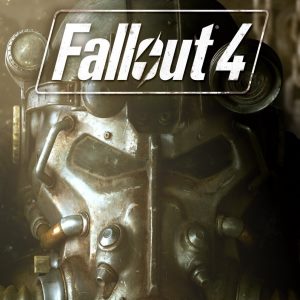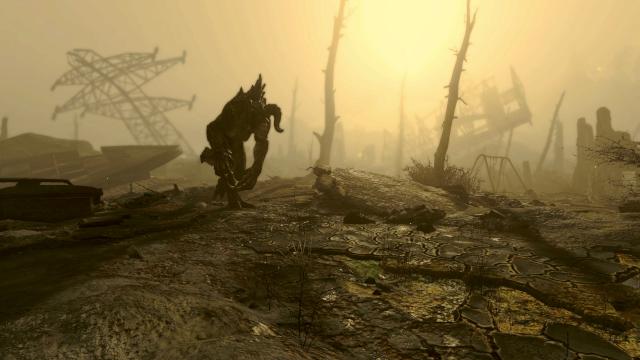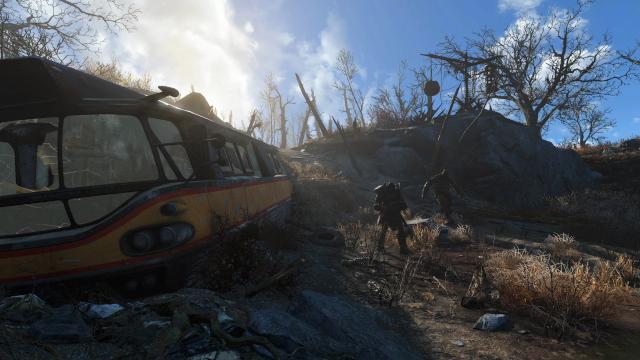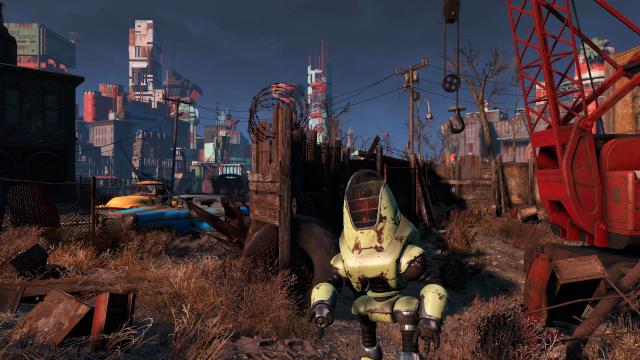
After years of waiting, Fallout 4 has finally arrived on the latest consoles and brings with it a whole new post-nuclear adventure which brings the hardship and pain of people’s struggles right to the forefront of your mind from start to finish. There was a lot of weight on Bethesda’s shoulders to make sure Fallout 4 lived up to expectations, and it’s pretty safe to say they’ve done exactly that.
At the start of the game everything appears rosy. You’re happily relaxing with your wife and baby on a sunny day, your robot butler coming out with various witty comments on things that have been going on, right up until the point you’re alerted to something on TV… a warning that nuclear explosions are starting to be seen. Luckily, you’ve not long had a visit from a Vault-Tec rep telling you you’ve earned a place in the local Vault 111 – handy! There’s a huge rush to the vault once the news breaks, with you and your family reaching it just as the blast of a nearby nuclear bomb washes over the city. A lucky escape accomplished, you end up being cryogenically frozen in the vault, ready to wake up when the radiation has died down and life can get back to (sort of) normal again. But mid-slumber you wake, just long enough to see someone release and kidnap your young child and murder your helpless wife. Many years later a problem with the vault’s power supply lets you escape, determined to find your son and seek revenge on whoever it was that destroyed your family.
And that, you’ll be pleased to hear, is the last I’ll mention of the story. From the moment you leave the fault you start making decisions, forging relationships which have a huge effect the later you get in the game. The annihilated Boston area – known as the Commonwealth – is home to a remarkable mix of man, beast and machinery, all of which are either out to kill you or engage you in conversation. Conversations which, I should point out, often end with them wanting to kill you. The way you interact with others, whether you choose to help them or not, or show an interest in their problems by using the conversation trees on offer, it all adds up, small nuggets of data tucked away in the game’s memory waiting to be unleashed when you least expect it. And as you chase after your son’s kidnapper (and indeed, your son himself) you’ll start to see other themes starting to build, most notably (and in the long run most importantly) involving the Synths – robotic beings who can easily appear to be entirely human, but with a fully computerised and robotic sell beneath the skin. Morals start to play a part – not in-game “should I steal this battered clipboard” kind of morals, but real world issues of where the line can be drawn between humans and robots who appear human. You need to be asking yourself what it means to be a human, and whether or not you can stomach the idea of non-biological beings have the “human” tag stamped on them may well dictate how the 2nd half of the game goes for you. Either way as time goes on the decision get all the more painful, and as has been the case with many dialogue driven games before, more often than not you’ll have to sacrifice something or someone to take the path you think is right.

These conversations though are a little hindered by the choices not being entirely clear – you’re given very vague ideas of what kind of line you’re about to deliver after your choice, but you never really know what’s coming (although a great PC mod has changed this – no good for folk like me on a console version though). This means the “sarcastic” option (which I tended to avoid while trying not to be a knobhead during conversations) could get very underused when it can actually deliver some very funny, or indeed very poignant, moments of discussion. Not only that, but when trying to ask for more information about something you might inadvertently rule yourself out of helping that person with a reasonably useful side-mission. You’ll also find a lot of NPCs wandering round with very little to say, something I found a bit of a shame considering how much more data the new consoles must surely be able to deal with.
But it’s worth remembering that unlike previous Fallouts, your own character has fully voiced dialogue too, which might go some way towards explaining why they kept unnecessary chats to a minimum. There are plenty of other little changes though which do have a far more positive impact on the experience. The VATS aiming system – a method of taking aim against an opponent which allows you to target a certain part of their body and the likelihood of you hitting it – no longer freezes time entirely, but just slows it down to the point where it’s still an incredibly valuable tool, but one which you can’t dwell on for too long. As such I tended to use it more for taking out enemies’ legs to slow them down and give me more time to think about how best to tackle them using whatever taped together weapon I was currently clutching in a mild panic state, but it could just as easily be used for landing critical hits to the head or wherever else you needed to target.

Radiation is no longer monitored in a separate meter, and now acts in the same bar as your health to limit the maximum health you can have at any point. The companion mobile app lets you keep an eye on the map and your inventory without having to check your Pip-boy in the game itself, and the RPG levelling system has had a bit of an overhaul which makes it very clear to see where to focus your efforts to reach a certain ability. The new method does mean you’ll use a lot of the earlier levels just reaching the higher tiers of skills (and as such might feel like you’re wasting the points) but the improvements start to come thick and fast once you’re beyond the first set and you’ll be unlocking impossible safes or massively boosting your charm offensive long before the game hits its closing moments.
There are loads of companions to pick up along the way too – 12 in total – each of which has various useful reasons to keep hold of them. Some are demons on the battlefield, others are skilled in lockpicking and so on. It’s useful to keep them onside, and finding out what they do and don’t like is key to making sure they’ve got your back when it matters. One companions enjoys it when you’re nice to people, or manage to pick a lock to find some hidden loot, but will disapprove if you steal something or pickpocket someone. Other companions are quite the opposite. One will even sniff around on the floor, bite people and shout at you when he finds something you might like. That’s Dogmeat. You might know him from Fallout 3. He’s a dog. He’s awesome. But all of the companions are worth keeping on standby, and while it’s not easy to swap them quickly, you can send them to any of your settlements throughout the map to either hang around and kill time or help to defend your new bases.
These settlements provide some micro-management among the chaos. Finding these areas lets you build on them, giving people somewhere to go and start to rebuild their lives, but you’ll need to plant crops, provide water and defence, even start creating buildings for them to shelter into. It’s an incredibly therapeutic task to clear out crumbled old buildings and scrappy gardens and build from scratch, but it takes some learning and can be awkward to get started. It’s a nice diversion though, that’s for sure.
There are some trademark Bethesda bugs along the way, things such as subtitles getting stuck, characters unable to find their way past simple items and the very occasional problems which require you to fire up a save from 5 minutes ago, but if you’ve played and enjoyed Fallout 3, New Vegas and Skyrim it’s nothing you won’t already have become accustomed to. That’s not to say it’s fun when it happens, having to abandon the last 10 minutes of hard graft just because something weird has happened isn’t ideal, but considering the scope of the game and the amount going on, not to mention the various routes the game can lead you down based on your actions, it’s not surprising a few bugs slipped through the net.

So before I finish, a final thought. When I’ve spoken to other gamers about their time so far with Fallout 4 the one thing that seems to be said more than anything else is “it’s just more Fallout 3…” – this is, presumably, the same Fallout 3 that won numerous awards back in 2008 and was widely believed to be one of the finest games on the last generation of consoles. So yes, while Fallout 4 has many elements which will remind you very firmly of Fallout 3, is that really such as bad thing? No, it’s not. But to tie up Fallout 4 with that single statement and assume it tells the whole story is doing it a great disservice. Fallout 4 deserves its place on the current crop of consoles, and will fill you with wonder, joy and heartbreak every bit as much as previous games in the series have. It’s a massive, thought provoking game which should really be filling a slot in everyone’s gaming collection, and whether you like to get stuck into the storyline or do what I’ve spent countless hours doing and just wander round discovering new things, you’re getting a lot of top quality game for your money.
Reviewed on PS4


Leave a Reply